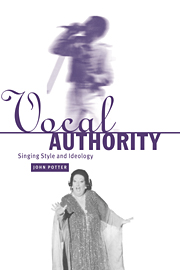Book contents
- Frontmatter
- Contents
- Preface
- Acknowledgements
- Chapter 1 Classical ideology and the pre-history of singing
- Chapter 2 The medieval period: religion, literacy and control
- Chapter 3 The Italian baroque revolution
- Chapter 4 The development of the modern voice
- Chapter 5 Concerts, choirs and music halls
- Chapter 6 Armstrong to Sinatra: swing and sub–text
- Chapter 7 Early music and the avant-garde: twentieth-century fragmentation
- Chapter 8 Elvis Presley to rap: moments of change since the forties
- Chapter 9 Singing and social processes
- Chapter 10 Towards a theory of vocal style
- Notes
- List of references
- Index
Chapter 1 - Classical ideology and the pre-history of singing
Published online by Cambridge University Press: 22 September 2009
- Frontmatter
- Contents
- Preface
- Acknowledgements
- Chapter 1 Classical ideology and the pre-history of singing
- Chapter 2 The medieval period: religion, literacy and control
- Chapter 3 The Italian baroque revolution
- Chapter 4 The development of the modern voice
- Chapter 5 Concerts, choirs and music halls
- Chapter 6 Armstrong to Sinatra: swing and sub–text
- Chapter 7 Early music and the avant-garde: twentieth-century fragmentation
- Chapter 8 Elvis Presley to rap: moments of change since the forties
- Chapter 9 Singing and social processes
- Chapter 10 Towards a theory of vocal style
- Notes
- List of references
- Index
Summary
The human voice is a marker of individual personality: no two voices sound the same. When the speaking voice is extended into song it becomes the supreme articulator of human desires, emotions and aspirations; almost every individual (or group of individuals) has the potential to use this resource in whatever way is appropriate. Every utterance we make, from the first scream or grunt onwards, is conditioned by our own past and that of the society we live in, and most of the time neither singer or listener is conscious of this ideological baggage that we all carry with us. In western society of the late twentieth century there seems to be an infinite number of vocal styles and techniques (a style being the outward sign of a singing variety, a technique the means of its realisation). The relationships between varieties of singing change over time according to the needs of singers and listeners. One variety, that used for what we in the West call classical music, appears to have a uniquely authoritative status relative to all other possible kinds. Its current status (and that of all kinds of singing) is the result of historical processes that have formed and re-formed over many hundreds of years. We all know what we think we mean by the commonsense term ‘classical music’ and the classical singing that comes with it.
- Type
- Chapter
- Information
- Vocal AuthoritySinging Style and Ideology, pp. 1 - 13Publisher: Cambridge University PressPrint publication year: 1998

